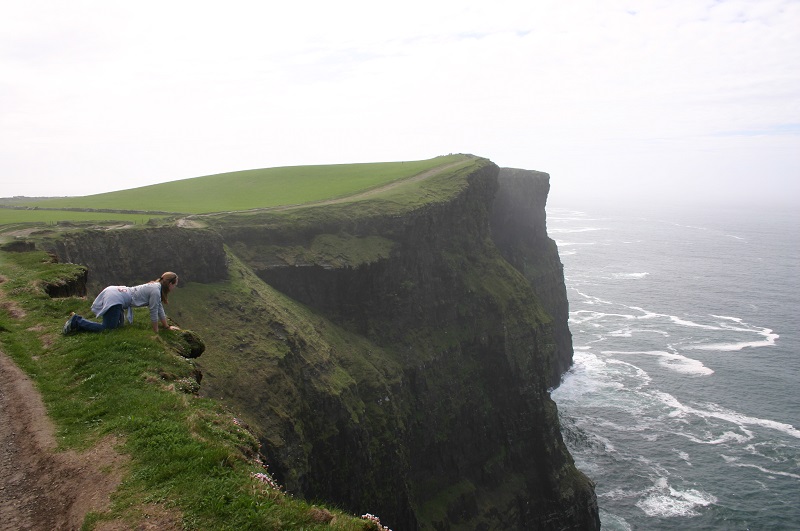
My friend and I sat at a wooden patio table overlooking the Tuscan countryside, casually sharing five bottles of wine with a couple we’d just met over the course of a sun-draped afternoon.
Our table mates, Hawaiian natives, had just come from Venice, which happened to be the next stop on our girls’ tour of Italy. I pulled my attention from the cypress trees pillared along the hillside back to our companions, hoping to hear recommendations for a good restaurant or concert to catch.
“Honestly, it was so gross,” was what I heard instead.
Record scratch.
“The water was dirty and brown. It smelled,” the other said, nose scrunched in distaste.
I quickly scrolled back through my mental Rolodex of travel memories, all the way back to the college trip my boyfriend and I had made across Europe—my 18-year-old eyes wide with wonder at the novelty of the watery city. Did I remember noticing a smell?
I sat there, on that sun-drenched afternoon in Tuscany, and felt perplexed by our tablemates’ takeaway. They had traveled across the world, to a city like no other—a city that has managed to bridge the threshold between land and sea and survive for more than a thousand years—and their lasting impression was of dirty water and a smell?
What was different about their mindset while visiting Venice than mine all those years ago? While I could make no assumptions about their headspace, I did notice one observable fact: they were from Hawaii, a place known the world over for its natural beauty and clear water.
Was it possible that they were simply unable to appreciate Venice for what it offered because they were comparing it to the relative paradise from whence they came?
More importantly, when it comes to travel, is this kind of comparison between the known and the unknown inevitable?
Or is there another way?
Shoshin is a Buddhist term meaning “beginner’s mind.” It refers to having an attitude of openness and eagerness for whatever you encounter in life, along with a willingness to set aside preconceptions and expectations.
Like children, life’s truest beginners, those who embrace shoshin are fascinated, inquisitive, engaged with their surroundings, and full of wonder with each new encounter.
Beginners don’t prejudge—they have no prejudice about what they’re going to encounter. They are willing to go into the unfamiliar and accept what is without trying to fit it into their preexisting worldview.
When you release comparisons, you free your mind to be completely, wholly engrossed in the now. And when you aren’t wasting time focusing on all the things something isn’t, your ability to be grateful for what you have grows. Embracing shoshin is the ultimate practice in mindful presence, and it can completely revolutionize your travel experiences.
Back to that college trip across Europe. Paris was the first stop on our tour, and we stashed our backpacks at our hostel and headed into the city, bright-eyed and excited to make our first memory at the most iconic Parisian experience of all: the Eiffel Tower.
What we weren’t prepared for, however, was how much the French love to strike. That particular day, the subway workers were striking, and, in a show of solidarity, the bus drivers and half of the taxi drivers were as well. All of Paris was trying to get around via a severely crippled public transportation system.
Undeterred, we looked to the skyline. We could see the Eiffel Tower. How far could it be? It was around 3 p.m. on a beautiful summer afternoon—we would just walk and enjoy our stroll through Paris.
Six hours and 15 minutes later, we finally made it—exactly 15 minutes after the very top observation deck closed for the night.
Our first memory—dreamed about and planned for so long—was made at the halfway deck, the highest point we could get to.
Did this cheapen the moment? Did the fact that we had planned on making it to the top and ended up only making it halfway devalue the fact that we were standing on the Eiffel Tower together, looking over the twinkling nighttime view of Paris?
It could have.
But embracing shoshin means being able to find value and joy in the moment we actually got, not spending our time mourning a different moment we had planned for. I distinctly remember the view, the cold wind whipping my hair about, and the realization that I had never been so happy.
I don’t always get it right though. Many years ago, my husband and I took a trip to Ireland and England. We arrived in Ireland first, jumping into our rental, a car nearly as short as my husband’s arm span, and striking out around the lower half of the country, road map in hand. We knew we had to be back for our flight in Dublin three days later, but other than that, we were free to explore the Emerald Isle at our leisure.
We dodged cows and explored the castles and ruins that dotted the countryside. We sang along with bands in tiny, dark bars and peeked over the edge of the Cliffs of Moher. It was joyful, transformative. We traveled our way through those days with a loose idea of a direction, open hearts, and wide eyes. It’s a trip I will never forget.
We flew from Dublin to London, and immediately I soured. The open, green fields were replaced with endless buildings blocking my view at every turn. The honking taxis drowned out the sound of our laughter, and no matter which way we walked, I felt like we were swimming upstream, the sidewalks teeming with millions of people who were in a great hurry to be wherever they were going. My opinion of London sank lower and lower, and we left a few days later with no desire to ever return.
I ruined my own experience.
Unable to disconnect myself from the natural beauty and friendliness of Ireland, I couldn’t see beyond the comparisons I kept making between the two places.
I wasn’t at all focused on what London was. All I could see was what it wasn’t.
Traveling with preconceptions and expectations introduces negative bias—you don’t evaluate something for what it is, you evaluate it based on how it measures up to something else. This devalues the experience of its inherent worth. But every experience in life offers you something; the trick is to see it for what it is.
Traveling with shoshin doesn’t mean you should stumble blindly through trips, just waiting to see what experiences you pinball into and out of. Countries have different cultures and customs to be aware of. You should know where the safe areas are and where the areas to avoid might be. You should know what attractions, history, and restaurants are available so that you can guide yourself into the experiences you are most interested in.
We didn’t haphazardly drive around Ireland and stumble upon the Ring of Kerry by accident any more than a child would walk through a park with a blindfold on.
We all owe it to ourselves to make informed, opened-eyed decisions about what we want to experience. I would rather hike to a waterfall than attend an opera, and an old book store would beat a governmental building any day.
Whatever you are drawn to, whatever you choose to fill your time with, allow yourself to be open to it, whatever it ends up being. Be curious. Focus on all that it is instead of all that it isn’t.
Teddy Roosevelt wasn’t wrong when he said, “Comparison is the thief of joy.”
The reasons people travel are as wide and varied as there are travel destinations. We travel to experience new and diverse cultures, to expand our horizons, to challenge ourselves, and even to escape ourselves. Travel is one of the best ways to develop empathy and compassion and a sense of self, allowing us to both discover ourselves and embrace the reality that we live in a world full of other equally worthy selves.
For all its benefits, travel isn’t easy. It can range from somewhat affordable to extremely expensive. It requires arranging time off work and care for children and pets and plants and mail. With so much effort and resources invested and so many benefits on the line, would-be travelers need to do everything they can to reap the best possible experience.
So embrace the wonder. The world is boundless and full of infinite experiences. Honor yourself by seeking out the ones that call to you.
And then honor yourself by valuing that moment, by being curious and engaged and open to whatever it brings.
When packing your bags, when waiting on flights and riding trains, when seeing new sights and eating new foods and hearing new languages, when driving on the other side of the road and riding a bike along cobblestone streets, when dancing and swimming and laughing and staring in wonder at something you’d only ever read about in a book—make sure your shoshin is right there with you.
I thought back to our Hawaiian friends only one more time, as I was sitting in a wobbly gondola, being paddled along narrow canals. It was late afternoon, and the tide was out. Our gondolier pointed out the high-tide mark on the buildings, a damp, moss-marked line more than a foot above the current level of the opaque, brown water.
A moment later we swept by, turning a corner with pinpoint precision, passing another gondola with only a hair’s breadth of space between our vessels. My eyes took in the parabolic bridges overhead, the peaches and blues and yellows of the crumbling walls, windows dotting the buildings, perched above flowering planters and wrought-iron balconies.
I thought about learning to live by the rhythm of the water, about learning to boat instead of drive, about all the poets and politicians and lovers and criminals who had walked these same paths and floated these same waters over thousands of years, about all the stanzas of human lives, echoing each other across the world, each played out on a different stage.
And I smiled with the wonder of it all as we floated on.
~






Read 16 comments and reply